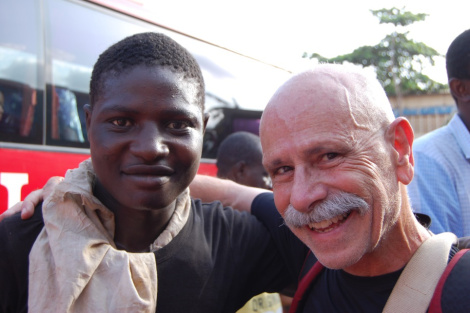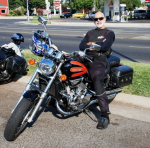What is white privilege in Ghana?
By AdministratorWhile it’s one of the phrases of the day, throughout my life I never thought that white privilege applied to me. Dad finished the 8th grade, and Mom after years of slaving away at sales jobs at Sears and other retailers, went to college after all the kids graduated. Her dream come true. We were a working class family. While not hungry we were always broke. Is this a formula for white privilege? Does working hard for everything you ever achieved or accomplished equal white privilege? My father wanted to be an electrician but in his country of birth, Austria, Jews weren’t allowed to be electricians. This never felt like white privilege to me. Is it? But the path travelled, even with hard work, had obstacles that were overcome because of the rules of our society that others were denied; yes, that’s white privilege.
Arriving in Accra, Ghana as a member of the Humanist Action: Ghana, several of us in one car headed to the bus station to go to Tamale in the north. There was a huge traffic jam, people, cars, motorcycles all jammed up under a highway overpass construction zone, all of us apparently trying to get to the same place. This fellow on the street sees us and decides to take charge of the situation. He starts running around in the traffic, hitting cars with a long wooden staff yelling at everyone to move out of the way; cars, motorcycles, pedestrians. After a time-consuming process of moving just a few blocks we get to a point where it’s time to get out and walk. He’s still with us, kind of sheep herding and encouraging us along. Clearly, he’s looking for that ever-present assumption that he’ll get a “tip” for his efforts. It’s hot, really hot, maybe 90 degrees, humidity about 90%.
After dragging our bags through the dirt, we finally arrive at the bus station. Our shepherd is still with us, carrying on with a kind of cacophony of lecturing and cheerleading to well, everyone. When we settle in to wait for our bus, he comes up to me to shake hands and, I suppose, to see if he can get his tip. As we shake hands, he rubs the skin on my arm and says in English, “your skin good, my skin bad.”
In these first few minutes of Ghana I had already heard the call of silimiinga (“white man”) a few times, but to hear this fellow say my skin was better than his, was not expected.
I made an attempt to disavow him of the merit of the obvious disparity of our skin color but he wouldn’t hear of it. When I told him that if I bleed my blood is red and if he bleeds his blood is red, he was quite bemused by this apparently previously unconsidered idea, but was he right?
 I had been in Ghana all of two hours and found myself in emotional turmoil. I knew I would often be the only white face in the crowd (boy was I ever!) but to get this perspective so soon upon arrival was shocking.
I had been in Ghana all of two hours and found myself in emotional turmoil. I knew I would often be the only white face in the crowd (boy was I ever!) but to get this perspective so soon upon arrival was shocking.
Now don’t get me wrong, I’m not implying that this fellow’s ideas are shared by everyone in Ghana, but his comment has stuck with me for weeks now.
So what happens when I go into town in Tamale or here in Bimbilla in northern Ghana? Perhaps due to the weather… but some days there are dozens of calls, “silimiinga,silimiinga” more often than not by the kids. The adults a little more subdued. They just stare.
The kids usually want to touch me, touch my arm, hold my hand, sometimes they want to pull the hair on my arms, just a tremendous curiosity. Often the first time they are seeing something they have just heard or seen on tv. Almost invariably they giggle with excitement, egging each other on to get closer, to touch, and to talk. Any apprehension is easily disarmed with a smile and then a handshake, a high five, holding their little hands is all it takes to make a friend.
The adults are more difficult to gauge. They hardly ever call out “silimiinga,” but their eyes say it anyway. Again, a smile disarms and a greeting of “daasiba” (“good morning”) or “antire” (“good afternoon”) adds to the disarming tool kit.
Sometimes when I stop at a food stand for a bite to eat, I am often forced to accept an offered chair, even if I absolutely don’t want to sit down; refusing is out of the question. Is this respect because I’m white or because I’m older? On one occasion when I protested, and the offer was proffered by someone whose English was quite good (since my Dagbanli is not so good). He said that he was respecting my age. How come that feels as weird as if it was because I was white? Here in Ghana, age is honored. Having survived to senior status is respected in a way that feels different than it does in the America.
But no matter, clearly trying to measure this against the idea that when I look in the mirror I don’t know that guy looking back. Well ok, lately I do recognize him; I just don’t like what I see. Where’s that handsome young guy with the big black beard who used to look back at me? So is my discomfort about being white in a black country, or is it about being old with a young man’s heart. Or is it just being honored in a way that I’ve never experienced before?
Yesterday I was walking in our village marketplace when some kids started to approach me, shouting silimiinga, then one girl maybe 7 years old, broke from the pack, and started running toward me with outstretched arms, OMG… she was going to give me a running hug, and she did, and it was the best hug ever; who cares why.
 George Gold is a lifelong activist from Northern California. He was a lecturer for Men Against Rape and spoke at high schools and colleges throughout Santa Cruz County, resulting in his appointment to the City Commission for the Prevention of Violence Against Women. George has served as President of the Atheists of Butte County, as a Member of the Chico Interfaith Council, and as the Coordinator of the Butte County Coalition of Reason. George has worked for the past 25 years as a computer systems engineer and brings a wealth of other experience to Ghana. He taught various grades in Long Beach schools and the Los Angeles County Juvenile Justice system. He has also worked as a dish washer, factory worker, construction worker, bus driver, and professional photographer. George is an avid motorcyclist and has ridden across the United States several times, including Route 66 end to end.
George Gold is a lifelong activist from Northern California. He was a lecturer for Men Against Rape and spoke at high schools and colleges throughout Santa Cruz County, resulting in his appointment to the City Commission for the Prevention of Violence Against Women. George has served as President of the Atheists of Butte County, as a Member of the Chico Interfaith Council, and as the Coordinator of the Butte County Coalition of Reason. George has worked for the past 25 years as a computer systems engineer and brings a wealth of other experience to Ghana. He taught various grades in Long Beach schools and the Los Angeles County Juvenile Justice system. He has also worked as a dish washer, factory worker, construction worker, bus driver, and professional photographer. George is an avid motorcyclist and has ridden across the United States several times, including Route 66 end to end.
